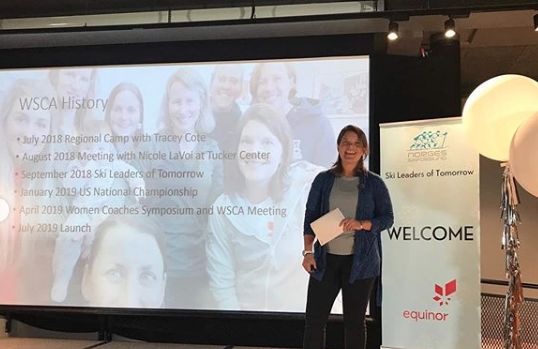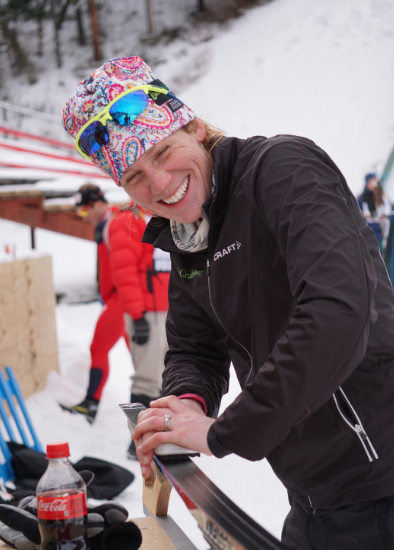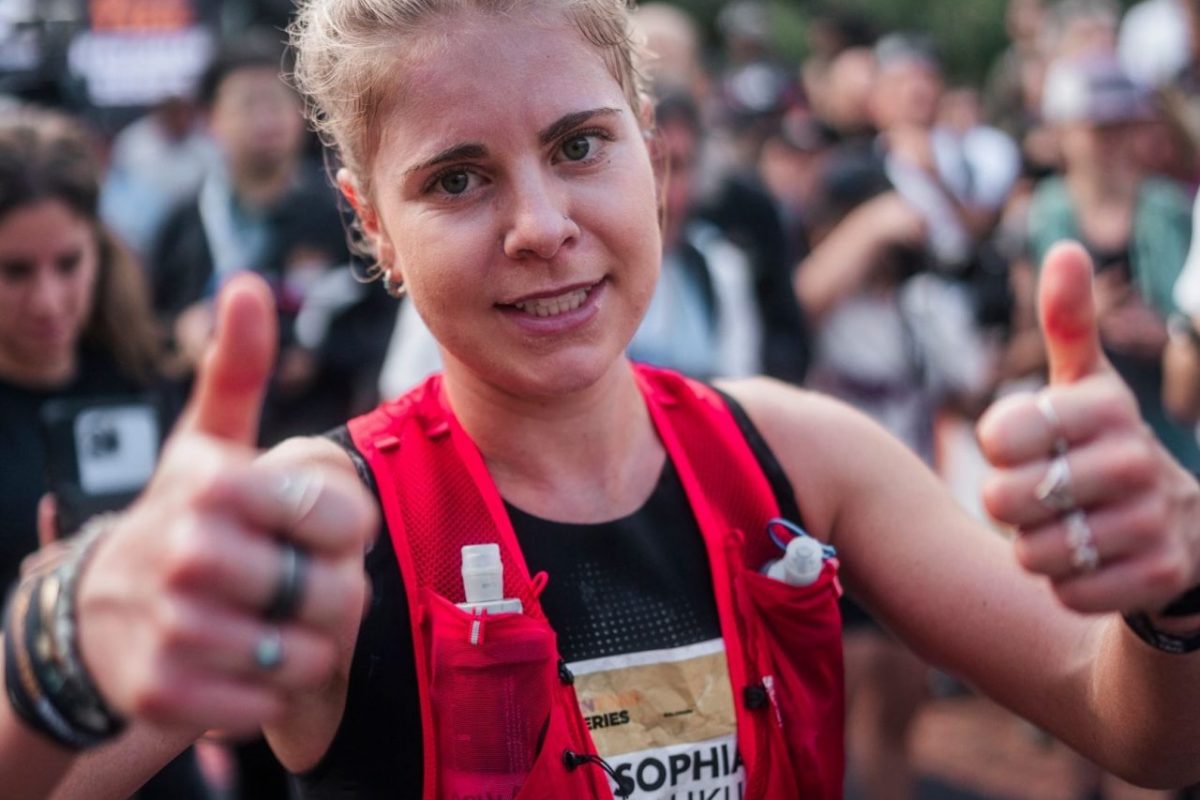
The magic brew. The secret sauce. The omniscient wax-tech with encyclopedic knowledge of all things ski wax and the ability to bestow the goods onto a ski base. Ah, those slick and slippery skis. And that bite of kick in slush. The mythology of wax in this sport looms large. And the few wax-mixologists of note live among their peers as deities.
The popular myth is this: some are gifted with the wax gene, most are not. Recently, I watched a webinar titled Waxing Skis & Waning the Gender Gap, where all came as equals. If you were transported from afar into the scene and knew nothing of “making good skis”, you’d think good wax-teching was as simple as being human – asking questions, trying new things, accepting success and failure as part of the process.
The webinar, which included over 115 participants, was part of an empowerment initiative produced for members of the WSCA, or Women Ski Coaches Association. In talking to WSCA founder and College of St. Scholastica head cross-country ski coach Maria Stuber, this was clear: old-school inequities toxify some wax cabins but it does not need to be that way.
“It’s easy for a newcomer to think that there are definitive right or wrong answers to all these wax questions and that your worth in the profession depends on having the right answers,” said Stuber. “When your worth is on the line it gets really scary to ask questions. If you can’t ask questions, you can’t learn. I hope our webinar communicated to new coaches that we should be searching to learn, not to find answers. I can’t control the environment all these women coaches are waxing skis in, but I can make sure that, at the very least, they have a safe and supportive place to ask questions and collaborate with peers through this platform.”

If you hear “there’s no problem” in the wax-cabin echo chamber – here’s some data. The WSCA conducted a survey among its members and found some stark numbers. Seventy-six percent of those surveyed said they did not have access to information to make them feel successful as a wax-tech. Fifty percent responded “yes” when asked, “Do you ever feel like you are at a disadvantage obtaining wax product or process information because of your gender?” For some background, 77% of survey respondents had four or more years of ski coaching experience.
Keynote webinar speakers included Kate Barton of the U.S. Ski Team and U.S. Paralympic Head Nordic Ski Coach Eileen Carey. Craftsbury’s Anna Schultz, Laura McCabe from MVNST, Tracey Cote from Colby College, and Dartmouth’s Cami Thompson Graves rounded out a panel discussing the nuances of ski prep in colloquial terms. This was a world-class group with serious cultural capital. There was also a remarkable absence of ego.
Let’s be clear, the webinar had nothing to do with airing grievances or bashing authority. This was a safe place to disseminate information and as Stuber said, “demystify this waxing world and share each other’s success and become an image that people associate with being able to wax skis at a high level.”
“It’s not all about confidence—-it’s about competence. When it comes to leadership skills we know that men excel at confidence. I would argue that we should focus on competence or the ability to do something successfully or efficiently because confidence grows naturally if you believe that you are competent.” – Kate Barton

There was talk of structure, not so secret klister mixing and application tricks, and developing a strategy to isolate variables to test when in a competitive environment. Cote spoke of using a single yet complex wax line over the years to really learn how, when, why some waxes were more effective than others. Simultaneously her methodology streamlined her waxing process while also giving her access to a richer array of products to choose from.
Carey also developed a survey for WSCA members to self-assess their competencies in all aspects of waxing and base prep. Those with areas of strength can provide their contact information to assist others with a perceived deficiency. For example, someone like Thompson Graves could assist a high school coach from Minnesota seeking help developing a strategy for structuring skis that works within that coach’s budget.
Reiterated by Carey via email was the idea that those in the ski waxing world are really on a “journey of continual learning.” Carey explained that the women she observed during the call, despite their expertise, embraced a message of lifelong learning.
“This is an important message because I think there is a perception that the only way to be good at waxing is to appear to know all the answers and be totally confident,” Carey said. “I think this is important to note because I think that women often get passed over for positions because they don’t necessarily exude confidence in the narrow scope of what is considered ‘acceptable’ in the wax world. In my estimation, the lack of ego, the ability to ask questions, and the knowledge that you don’t know everything is a huge benefit. I think that people who make decisions in the ski world, whether it be what coach to hire or which coaches should represent a team on a big trip, should expand the vision of what makes a good coach and what makes a good waxer. Someone with all the answers is probably limiting the scope and quality of their work with athletes and in the wax room. If we can acknowledge as a community that there are many versions of what it looks like to be competent, we will all be better for it.”
With a dizzying array of new products on the market due to new wax restrictions, a window exists for women coaches to lead. Barton was succinct when discussing her thoughts on how to move forward.
“It’s not all about confidence—-it’s about competence. When it comes to leadership skills we know that men excel at confidence. I would argue that we should focus on competence or the ability to do something successfully or efficiently because confidence grows naturally if you believe that you are competent,” said Barton during the webinar.
The WSCA will continue to produce content for members to assist their pursuit of developing, retaining, and advancing women in ski coaching leadership.
Jason Albert
Jason lives in Bend, Ore., and can often be seen chasing his two boys around town. He’s a self-proclaimed audio geek. That all started back in the early 1990s when he convinced a naive public radio editor he should report a story from Alaska’s, Ruth Gorge. Now, Jason’s common companion is his field-recording gear.



